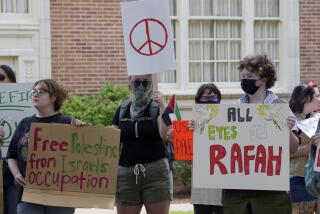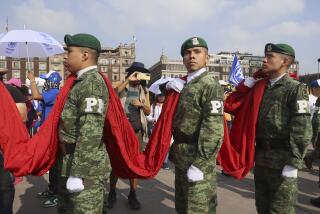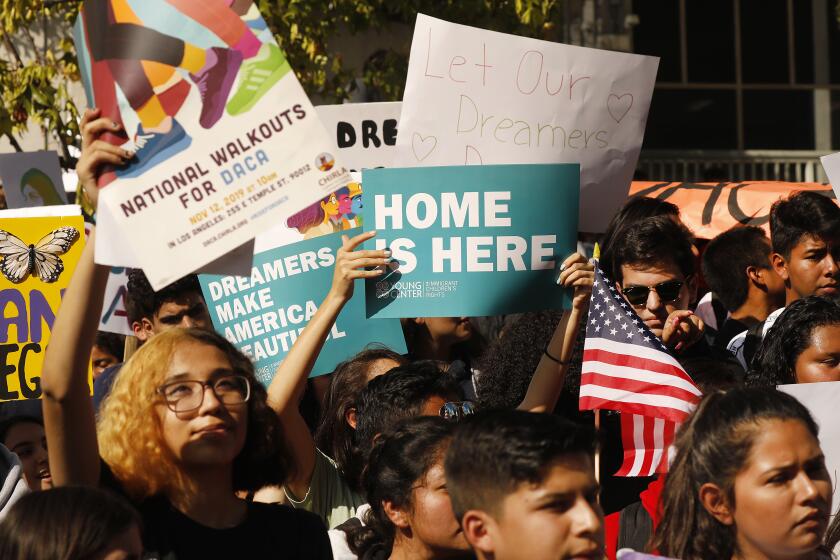Thatcher Shines, but the Skeptics Persist
Aboard the jetliner on its journey home from Margaret Thatcher’s Soviet tour last Wednesday, stewards were dispensing champagne to the press corps--a gift from the prime minister. Expansive in triumph, she exuded characteristic confidence and spoke of the work left to do, both in Britain and in the field of East-West relations. Thatcher made clear that she intended to secure a third term and remain the prime minister well into the next decade.
The contrast with Neil Kinnock’s return from Washington the previous Friday could not have been more dramatic. The Labor Party leader’s meeting with President Reagan, planned to showcase Kinnock and balance the “Maggiemania” that would emerge from Moscow, had ended as a fiasco. While a shaken Kinnock sipped birthday champagne presented to him by the British Airways crew, the Tory-dominated press was trumpeting the White House view that Kinnock’s proposal “for a unilateral nuclear disarmament . . . would undercut the West’s negotiating position in Geneva.” Kinnock was left in unhappy silence worrying that any rebuttal would only fuel accusations that he was whining about the press.
Clearly, when it comes to British leaders, diplomatic journeys and champagne toasts, it is far better to give than to receive.
In fact, Thatcher had given the performance of her life: the candle-lighting at the ancient monastery at Zagorsk (cast by the Times of London as a “tiny light in a great totalitarian gloom”), the much-heralded 13 hours of talks with Mikhail S. Gorbachev, the remarkable spectacle of the British prime minister interrupting journalists on Moscow television to explain her view that nuclear weapons (even in Europe) were needed to keep the peace.
In the run-up to a British general election and the wind-down of a U.S. Administration, it was high political art and pleasantly diverting news. But was it a watershed in East-West relations? Will there be a new spirit of glasnost in the international arena? There are grounds for skepticism.
Thatcher lauded the Gorbachev proposals for “a more open society, new incentives, restructuring.” But Gorbachev’s reforms are more than a policy of liberalization. They seem to signal a historic struggle to decentralize and democratize power, reduce bureaucratic control and revitalize initiative from below in culture, politics and the workplace. Western leaders will have to fundamentally reconsider the agenda for socialism in Eastern Europe.
Thus far, ideological combat between East and West has been based implicitly on a trade-off between the economic securities of the Soviet system and the personal freedoms and political liberties of Western traditions. In attempting to put some crucial principles of democracy into operation within a socialist economy, Gorbachev challenges these ideological verities. It is not only the “Iron Lady” who will find it difficult, and politically dangerous in both domestic and geopolitical terms, to recognize how deep the transformations may be in Soviet society, scrap the sorry phrases about totalitarianism and resist the instinct to red-bait passionately at the first hint of trouble. Without such a recognition, however, the fundamental reconstruction of East-West relations seems unlikely.
Thatcher’s hard line on the necessity of nuclear deterrence follows closely from this ideological blind spot. In this case her fundamentalist view toward nuclear arms threatens to throw a wrench into any accord that the superpowers might achieve. It is also sharply at odds with Soviet policy, expressed most notably in the Reykjavik proposals, that the dismantling of nuclear arsenals is the best security against nuclear disaster. Indeed, within a few days ofThatcher’s departure from the Soviet Union, Moscow was carefully registering the distance between the two sides. Pravda stressed the “resolute disagreement” over the principles of nuclear deterrence, a more analytic and diplomatic characterization of the problem discussed earlier by a spokesman for the Soviet Foreign Ministry, who referred to Thatcher as a “nuclearphiliac.”
Finally, one must remember that while Thatcher went to Moscow to speak for the Western alliance, it will be up to the Americans to negotiate any agreements with the Soviets. This is the problem. Reagan’s sorry record of performance and inconsistency on arms control and the broader spectacle of foreign-policy disarray encourage congressional suspicions about any last-minute effort by the Administration to salvage an arms-control treaty. Foreign-policy confrontations between the White House and Congress--over Nicaraguan contra aid and “Star Wars,” to name but two issues--are brewing while the Iran-contra investigations run their course.
It seems unlikely that a new arms control agreement will emerge from this mess to make tangible whatever atmospheric improvements were registered in Moscow last week. Without such gains, a new openness in East-West relations seems mainly wishful thinking.
More to Read
Start your day right
Sign up for Essential California for news, features and recommendations from the L.A. Times and beyond in your inbox six days a week.
You may occasionally receive promotional content from the Los Angeles Times.






